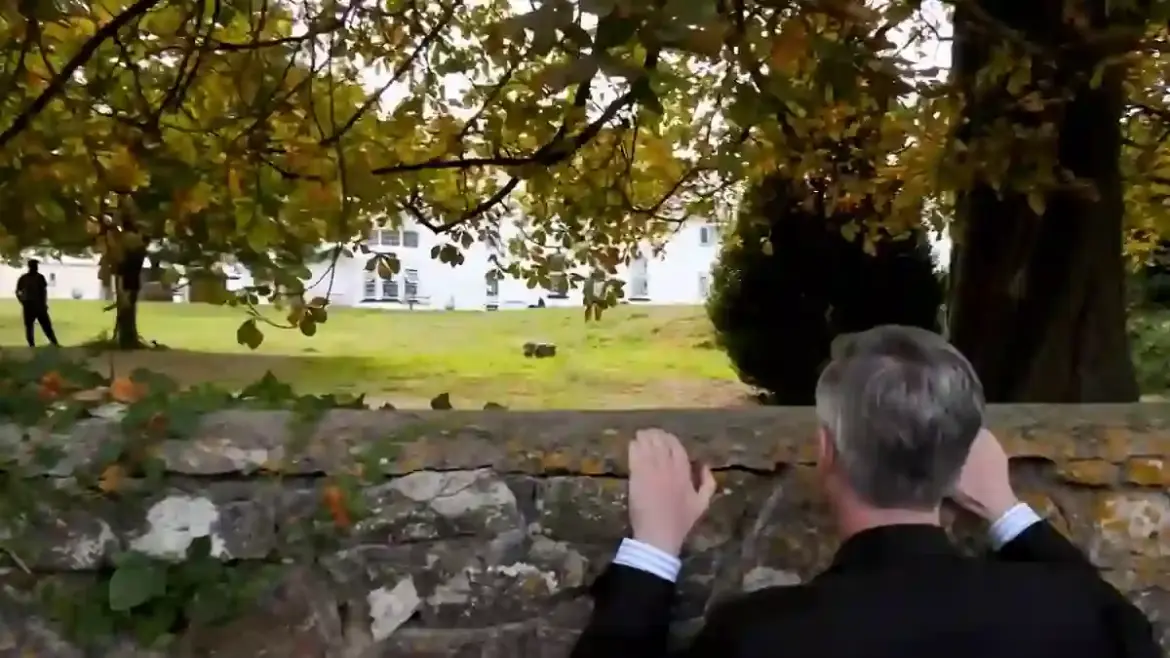In the rolling countryside of north Somerset, a secluded estate known as Winford Manor has quietly existed for centuries—until now.
Once a serene hotel tucked away from prying eyes, it has unexpectedly become the focus of a national debate about Britain’s asylum system.
The trigger? Jacob Rees-Mogg, the former Conservative Cabinet minister, visiting the site and broadcasting his concerns on GB News.
Dressed in his trademark double-breasted suit, Rees-Mogg was filmed peering over a perimeter wall and calling out to a group of foreign men in the distance.
“‘Hallo,’” he chirped, “‘is this an illegal migrant place?’” The footage has since gone viral, amassing over half a million views on YouTube.
While the scene might strike some as faintly comical, the reality behind it is far from amusing.
Winford Manor: From Hotel to Asylum Accommodation
Winford Manor, dating back to the 1600s, has long been a jewel of the West Country.
With 7.5 acres of landscaped gardens, it previously operated as a religious retreat before converting into a hotel in 2008.
Guests enjoyed underfloor heating, mist-free bathroom mirrors, individual thermostats, and flatscreen TVs. It even earned the UK’s Green Tourism Gold Award.
Everything changed in September 2022, when the hotel ceased normal operations to become a holding centre for asylum seekers.
Locals, including parish council members, voiced concerns about the lack of consultation, though they were reassured the contract with the Home Office would only last two years.
Now, three years on, the residents remain—and clarity about who is living there is still scarce.
Locals Speak: Uncertainty Breeds Anxiety
For neighbors like businessman Tony Gould, who lives directly behind the hotel with his young children, the presence of asylum seekers has stirred unease.
“I’ve seriously thought about packing up and renting somewhere else,” he admits.
Though he has never felt personally threatened, he worries about boundaries and safety.
Gould recounts incidents that highlight the uncertainty: men wandering onto his property, taxis delivering new arrivals, and even a high-paid interpreter showing up unexpectedly.
“I’ve had to install security cameras myself,” he says, “but the authorities still want their taxes and rates.”
His partner, Carly Gibbs, shares his concern, emphasizing the lack of communication when the hotel first transitioned.
“By the time we even knew about it, the migrants had already moved in. It shows no regard for the safeguarding of our children.”
Community Divided: Fear, Concern, and Acceptance
While some locals express anxiety, others are more accepting.
Kevin McGovern, who lives adjacent to the manor, notes: “They haven’t caused me any trouble, so I don’t have a problem. But no one knows who they are.”
Others echo the sentiment, emphasizing the lack of information about residents’ backgrounds and histories.
Yet some residents take a pragmatic view.
One neighbor near the hotel entrance asks, “They’ve been there for the past three years, so why the fuss all of a sudden?” Amid these mixed opinions, local charities like Refugees Welcome North Somerset provide support, though they declined to comment to the press.
National Debate: Asylum Policy Under Scrutiny
Rees-Mogg’s broadcast has thrust this remote corner of Somerset into the heart of a broader conversation about Britain’s asylum system, following a summer when race and immigration were frequently in the headlines.
Demonstrations at migrant accommodation sites and controversies over patriotic flags have kept the issue in public view.
Government officials maintain that practical steps are underway to address the system’s backlog and reduce the number of people in hotels.
Yet for locals, the unresolved question remains: who exactly is living behind those padlocked gates?
The Middle of Nowhere No More
Once tucked away in “the middle of nowhere,” Winford Manor is now anything but hidden.
Its transition from idyllic hotel to asylum centre, combined with viral footage of a high-profile politician scrutinizing the site, has turned a quiet Somerset estate into a microcosm of Britain’s asylum debate.
For residents and the nation alike, what was once a secluded retreat has become a symbol of uncertainty, concern, and ongoing national conversation.
